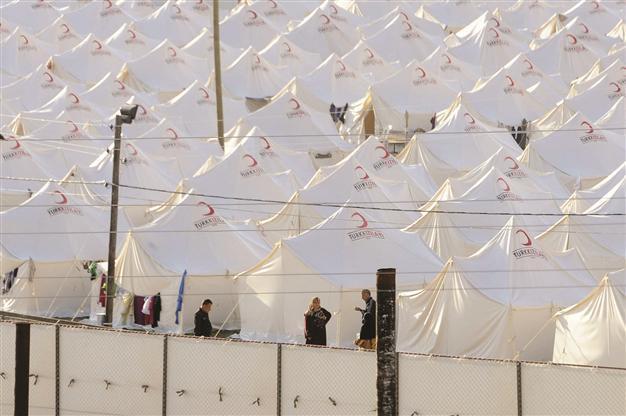Syrian refugees in Turkish camps live on 80 liras of monthly aid
ANKARA

As of Nov 12, 202,793 of the Syrian refugees who had fled the civil war in their homeland were living in refugee camps in Turkey while 491,000 were living in rented accommodation outside the camps, according to the report. DAILY NEWS photo, Selahattin SÖNMEZ
Syrian refugees staying in refugee camps in the southern provinces of Turkey have been living on an allowance of 80 Turkish Liras ($40 or 29 euros) per month, according to a recent report drafted by the Parliament’s Human Rights Inquiry Commission.
Hot meal distribution in refugee camps was stopped due to “food culture differences,” and refugees now cook their meals on their own with ingredients they buy from markets at refugee camps via a card system. Many refugees complained that 80 liras was not enough for their food shopping from grocery providers at refugee camps, since no other monetary assistance was provided to the refugees, the report said.
Sixty of the 80 liras are provided by the United Nation’s World Food Program while remaining 20 liras are provided by Turkish Prime Ministry’s Disaster and Emergency Management Directorate (AFAD).
A sub-commission of the parliamentary panel formed to investigate the conditions of refugees drafted the report following their visits to three refugee camps in the southern provinces of Kilis and Kahramanmaraş on Nov. 13 and 14.
As of Nov. 12, 202,793 of the Syrian refugees who had fled the civil war in their homeland were living in refugee camps in Turkey while 491,000 were living in rented accommodation outside the camps, according to the report.
Refugees staying at camps in Kilis complained that grocery prices in refugee camps were very high comparing to prices in the city, the report said, while refugees staying at camps in Kahramanmaraş did not voice a similar complaint. “The tender system in Kahramanmaraş led to low prices in grocery stores in the refugee camp. A similar tender system should be implemented in Kilis,” the report said.
Refugees who left the camps for more than 15 days were not accepted into the camps when they came back, on the grounds that capacity was full, the report said. Families had been split up over the strictly implemented rule, according to the report. “This rule should be more flexible in considering the family’s integrity,” the report suggested.
